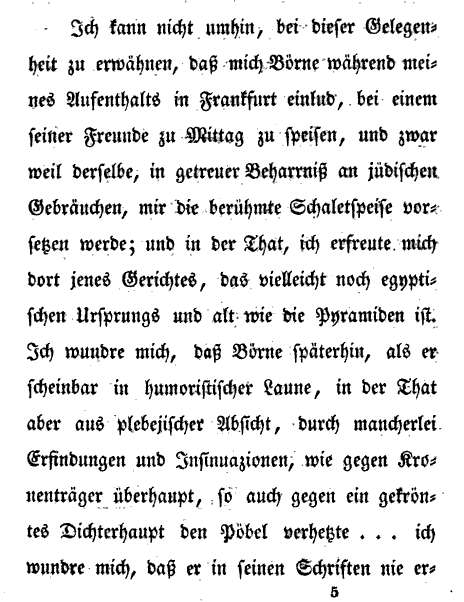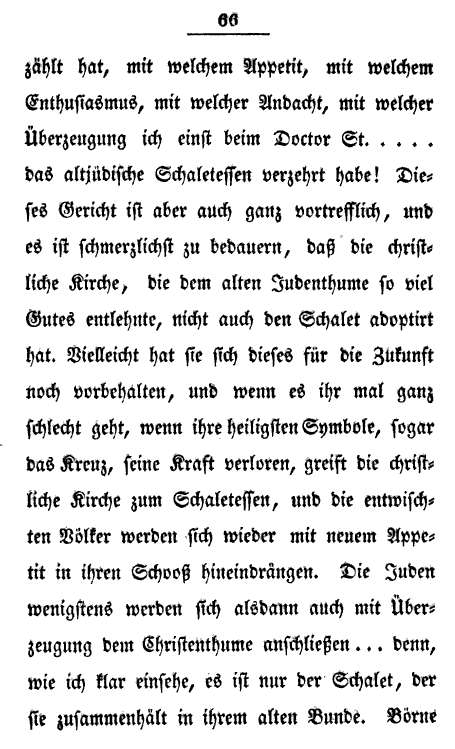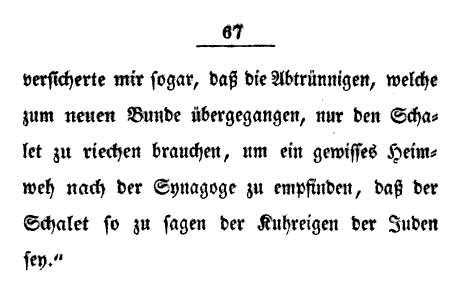
The catalog which this is from gives the following inscription הירץ פופרט זיין ב[ת] ז[וג] בת משה צור ליטר בשאלט לפק, or, "Hirtz Popert's s[pouse], daughter of Moses zur Leiter, in [the year 5]340 (=1579/80)."
What's especially cool is that the year 340 is written as שאלט instead of שם so that it reads schalet, or the original German Jewish word for that familiar dish known as . . . cholent.
Speaking of schalet/ cholent, a lot of people think that 20th century Jews involved in Kiruv (outreach) discovered the seductive powers of cholent. In fact Heinrich Heine knew all about it well over 150 years ago, when he wrote a poetic odes to cholent (schalet):
For example, these lines from his poem Princess Sabbath ("she" in the poem is the Sabbath itself):
She allows her lover all things
Save this one, — tobacco-smoking:
" Loved one ! smoking is forbidden,
" For today the Sabbath is.
" But at noon, in compensation,
" Thou a steaming dish shalt taste of,
" Which is perfectly delicious —
" Thou shalt eat today some Schalet! "
" Schalet, beauteous spark immortal,
" Daughter of Elysium !"
Thus would Schiller's song have sung it,
Had he ever tasted Schalet.
Schalet is the food of heaven,
Which the Lord Himself taught Moses
How to cook, when on that visit
To the summit of Mount Sinai,
Where the Lord Almighty also
Every good religious doctrine
And the holy ten commandments
Publish'd in a storm of lightning.
Schalet is the pure ambrosia
That the food of heaven composes—
Is the bread of Paradise;
And compared with food so glorious,
The ambrosia of the spurious
Heathen gods whom Greece once worshipp'd
And were naught but muffled devils,
Was but wretched devil's dung.
Save this one, — tobacco-smoking:
" Loved one ! smoking is forbidden,
" For today the Sabbath is.
" But at noon, in compensation,
" Thou a steaming dish shalt taste of,
" Which is perfectly delicious —
" Thou shalt eat today some Schalet! "
" Schalet, beauteous spark immortal,
" Daughter of Elysium !"
Thus would Schiller's song have sung it,
Had he ever tasted Schalet.
Schalet is the food of heaven,
Which the Lord Himself taught Moses
How to cook, when on that visit
To the summit of Mount Sinai,
Where the Lord Almighty also
Every good religious doctrine
And the holy ten commandments
Publish'd in a storm of lightning.
Schalet is the pure ambrosia
That the food of heaven composes—
Is the bread of Paradise;
And compared with food so glorious,
The ambrosia of the spurious
Heathen gods whom Greece once worshipp'd
And were naught but muffled devils,
Was but wretched devil's dung.
In 1840 Heine wrote a book, a tribute to another very Germanized converted Jew, Ludwig Börne (born ליב ברוך). He writes the following:
I cannot help remarking in this connection that Börne invited me during my stay in Frankfurt to dine at midday with a friend, because the latter, in persistent loyalty to Jewish customs, would set before me the cholent stew (schalet); and indeed I enjoyed there the dish that is perhaps of Egyptian origin and as old as the Pyramids. I am surprised that Börne later, when, apparently in a humorous mood but in truth out of plebian intention, agitated the mob not only against crowned monarchs but also against a crowned poet - I am surprised that he has never told in his writings with what appetite, with what enthusiasm, with what devotion I once devoured the ancient Jewish cholent meal at the home of Doctor St....! This dish is indeed quite excellent, and it is most painfully to be regretted that the Christian church, which has borrowed so many good things from ancient Judaism, has not adopted cholent as well. Perhaps it is reserving it for the future, and when things are really going badly for it, when its most sacred symbols, even the Cross, will have lost their power, the Christian will grasp at the cholent meal, and the peoples who have fled will crowd back to its womb with renewed appetite. At least the Jews will then join Christianity with conviction, for, as I can clearly see, it is only cholent that keeps them in their old covenant. Börne even assured me that the apostates who had gone over to the new covenant had only to smell cholent in order to feel a certain nostalgia for the synagogue, that cholent was, so to speak, the cowherd's melody of the Jews.Lest one doubt that this tribute to cholent was really written in 1840, complete with Heine's (half-kidding) and ironically wrong prediction that cholent would bring Jews to the church, here are the pages








Cholent is not of German origin. It is French- relating to the how the dish is coooked -Chaud- meaning hot and lent meaning slow. It was a dish cooked hot for a long time. Hence the word "Chaudlent"!
ReplyDeleteI didn't say it's of German origin. Schalet is what the German Jews called it. It may or may not come from the German schale, or pot.
ReplyDeleteEither way, it's not exactly proven that cholent comes from chaud lent. It's a theory.
The man LIKED cholent? Those Christians are indeed crazy!
ReplyDeleteAlthough Heine was a converted Jew, he was, you know, a Jew.
ReplyDeletewhat about the Sabbath spice?
ReplyDeleteChristian cholent = Boston baked beans
ReplyDelete